Industrial Relations: Theories, Applications, and Dispute Analysis
VerifiedAdded on 2023/06/10
|6
|923
|406
Report
AI Summary
This report provides an analysis of industrial relations, beginning with an overview of key theories such as Unitarist, Pluralist, and Radical perspectives, along with a discussion of Marxist theory. It examines the Industrial Relations Reform Act of 1993 and the elements of industrial relations, including dispute resolution and collective bargaining. The report then delves into the HRM approach to employment relationships, contrasting hard and soft approaches, and their effects on employees. A significant portion of the report focuses on the NSW Train Workers Dispute of 2018, detailing the parties involved, the causes of the dispute, the processes used, and the outcomes, including the economic impact and the eventual agreement. The report also provides a perspective on the issues, highlighting the strike, the negotiation failures, and the deprivation of worker rights. References to relevant academic sources are included to support the analysis.
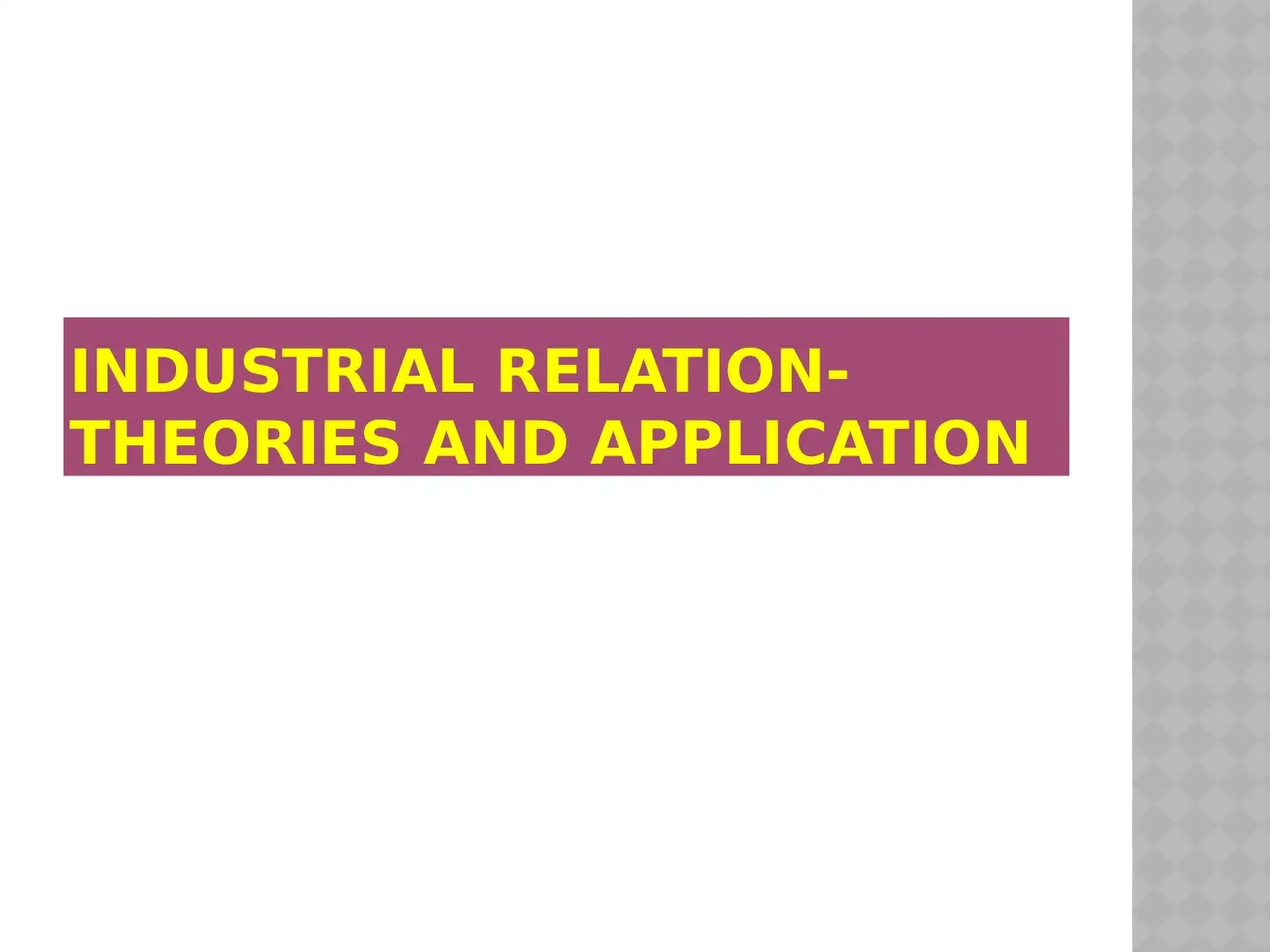
INDUSTRIAL RELATION-
THEORIES AND APPLICATION
THEORIES AND APPLICATION
Paraphrase This Document
Need a fresh take? Get an instant paraphrase of this document with our AI Paraphraser
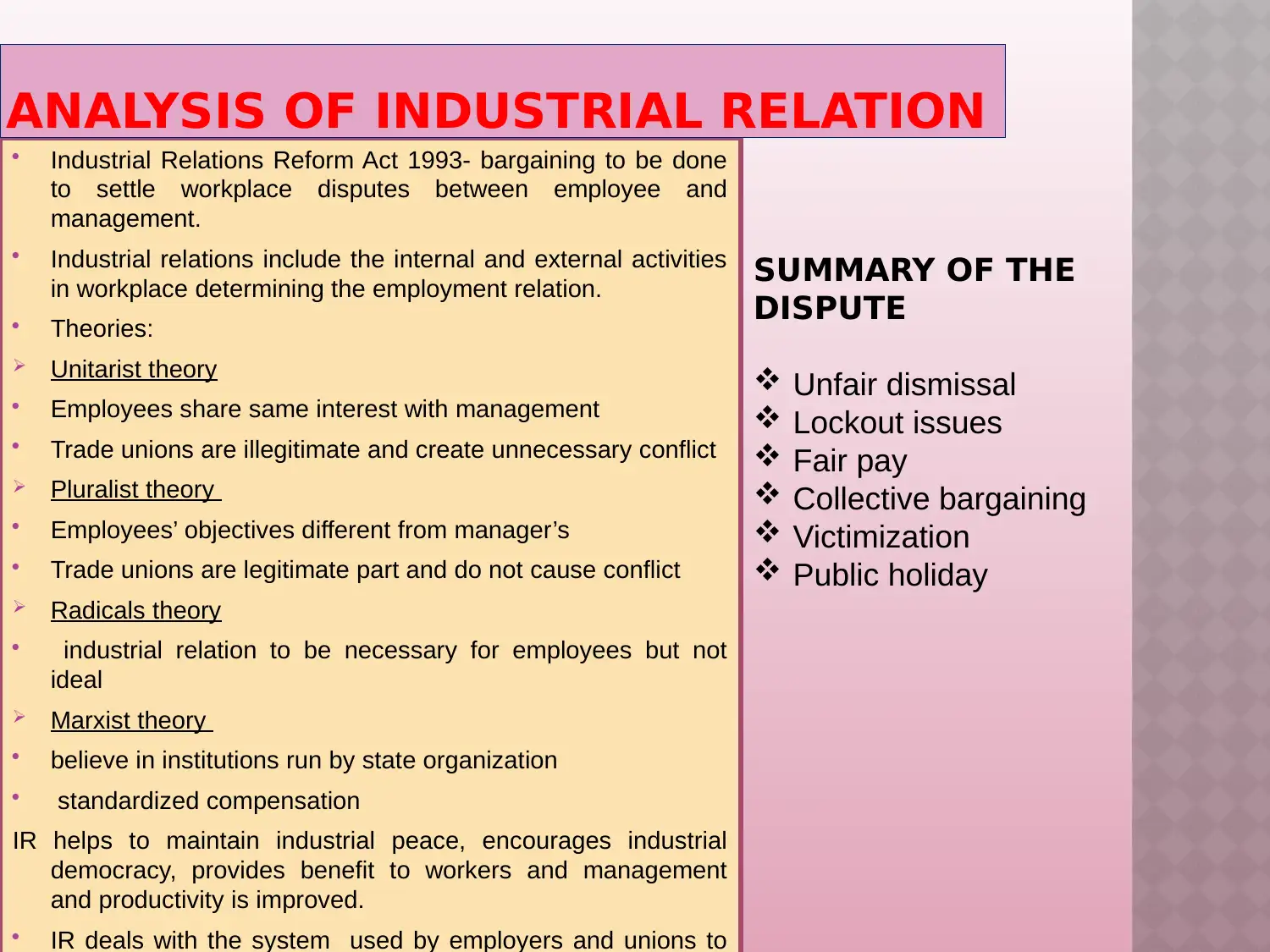
Industrial Relations Reform Act 1993- bargaining to be done
to settle workplace disputes between employee and
management.
Industrial relations include the internal and external activities
in workplace determining the employment relation.
Theories:
Unitarist theory
Employees share same interest with management
Trade unions are illegitimate and create unnecessary conflict
Pluralist theory
Employees’ objectives different from manager’s
Trade unions are legitimate part and do not cause conflict
Radicals theory
industrial relation to be necessary for employees but not
ideal
Marxist theory
believe in institutions run by state organization
standardized compensation
IR helps to maintain industrial peace, encourages industrial
democracy, provides benefit to workers and management
and productivity is improved.
IR deals with the system used by employers and unions to
ANALYSIS OF INDUSTRIAL RELATION
SUMMARY OF THE
DISPUTE
Unfair dismissal
Lockout issues
Fair pay
Collective bargaining
Victimization
Public holiday
to settle workplace disputes between employee and
management.
Industrial relations include the internal and external activities
in workplace determining the employment relation.
Theories:
Unitarist theory
Employees share same interest with management
Trade unions are illegitimate and create unnecessary conflict
Pluralist theory
Employees’ objectives different from manager’s
Trade unions are legitimate part and do not cause conflict
Radicals theory
industrial relation to be necessary for employees but not
ideal
Marxist theory
believe in institutions run by state organization
standardized compensation
IR helps to maintain industrial peace, encourages industrial
democracy, provides benefit to workers and management
and productivity is improved.
IR deals with the system used by employers and unions to
ANALYSIS OF INDUSTRIAL RELATION
SUMMARY OF THE
DISPUTE
Unfair dismissal
Lockout issues
Fair pay
Collective bargaining
Victimization
Public holiday
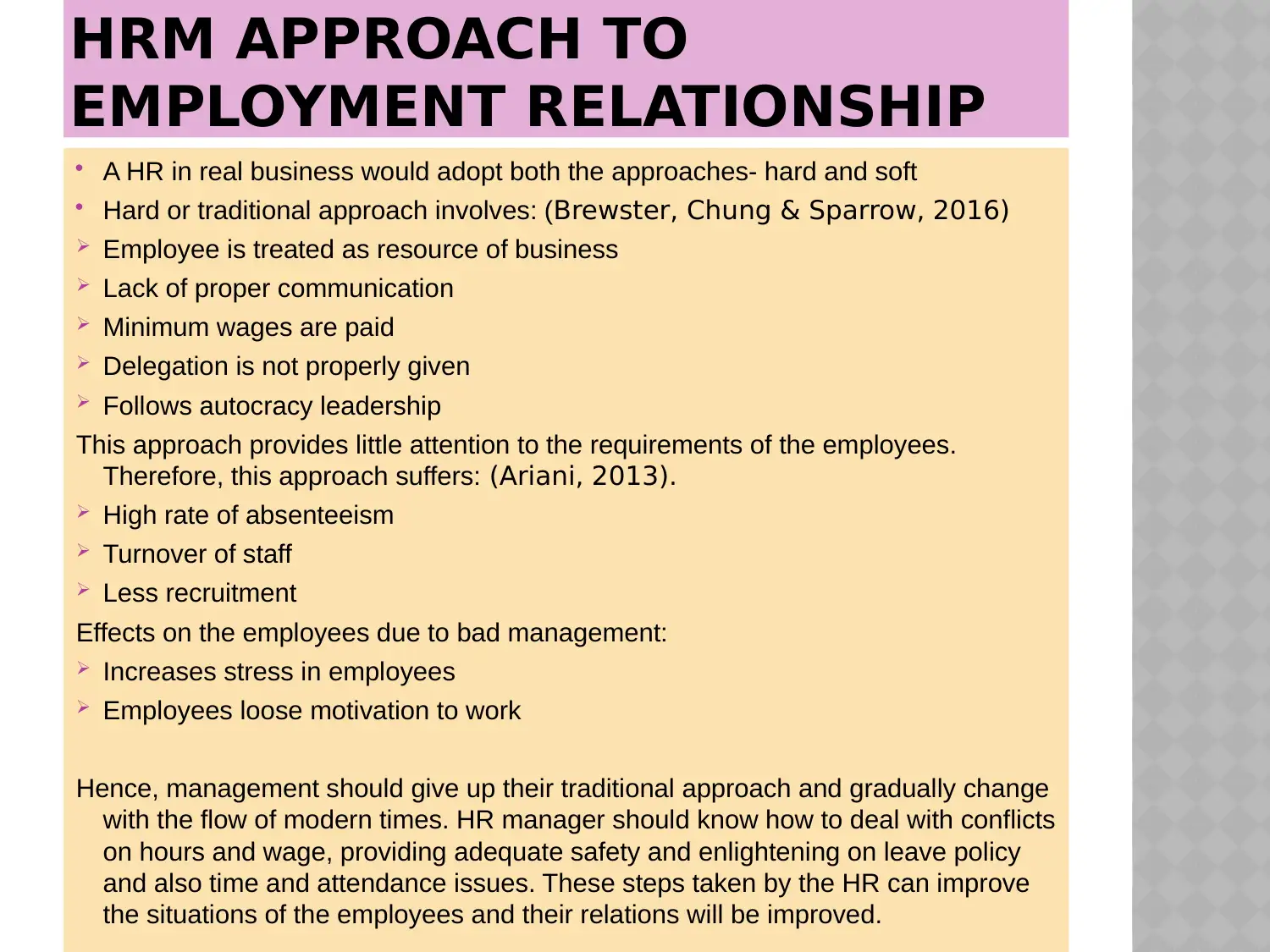
HRM APPROACH TO
EMPLOYMENT RELATIONSHIP
A HR in real business would adopt both the approaches- hard and soft
Hard or traditional approach involves: (Brewster, Chung & Sparrow, 2016)
Employee is treated as resource of business
Lack of proper communication
Minimum wages are paid
Delegation is not properly given
Follows autocracy leadership
This approach provides little attention to the requirements of the employees.
Therefore, this approach suffers: (Ariani, 2013).
High rate of absenteeism
Turnover of staff
Less recruitment
Effects on the employees due to bad management:
Increases stress in employees
Employees loose motivation to work
Hence, management should give up their traditional approach and gradually change
with the flow of modern times. HR manager should know how to deal with conflicts
on hours and wage, providing adequate safety and enlightening on leave policy
and also time and attendance issues. These steps taken by the HR can improve
the situations of the employees and their relations will be improved.
EMPLOYMENT RELATIONSHIP
A HR in real business would adopt both the approaches- hard and soft
Hard or traditional approach involves: (Brewster, Chung & Sparrow, 2016)
Employee is treated as resource of business
Lack of proper communication
Minimum wages are paid
Delegation is not properly given
Follows autocracy leadership
This approach provides little attention to the requirements of the employees.
Therefore, this approach suffers: (Ariani, 2013).
High rate of absenteeism
Turnover of staff
Less recruitment
Effects on the employees due to bad management:
Increases stress in employees
Employees loose motivation to work
Hence, management should give up their traditional approach and gradually change
with the flow of modern times. HR manager should know how to deal with conflicts
on hours and wage, providing adequate safety and enlightening on leave policy
and also time and attendance issues. These steps taken by the HR can improve
the situations of the employees and their relations will be improved.
⊘ This is a preview!⊘
Do you want full access?
Subscribe today to unlock all pages.

Trusted by 1+ million students worldwide
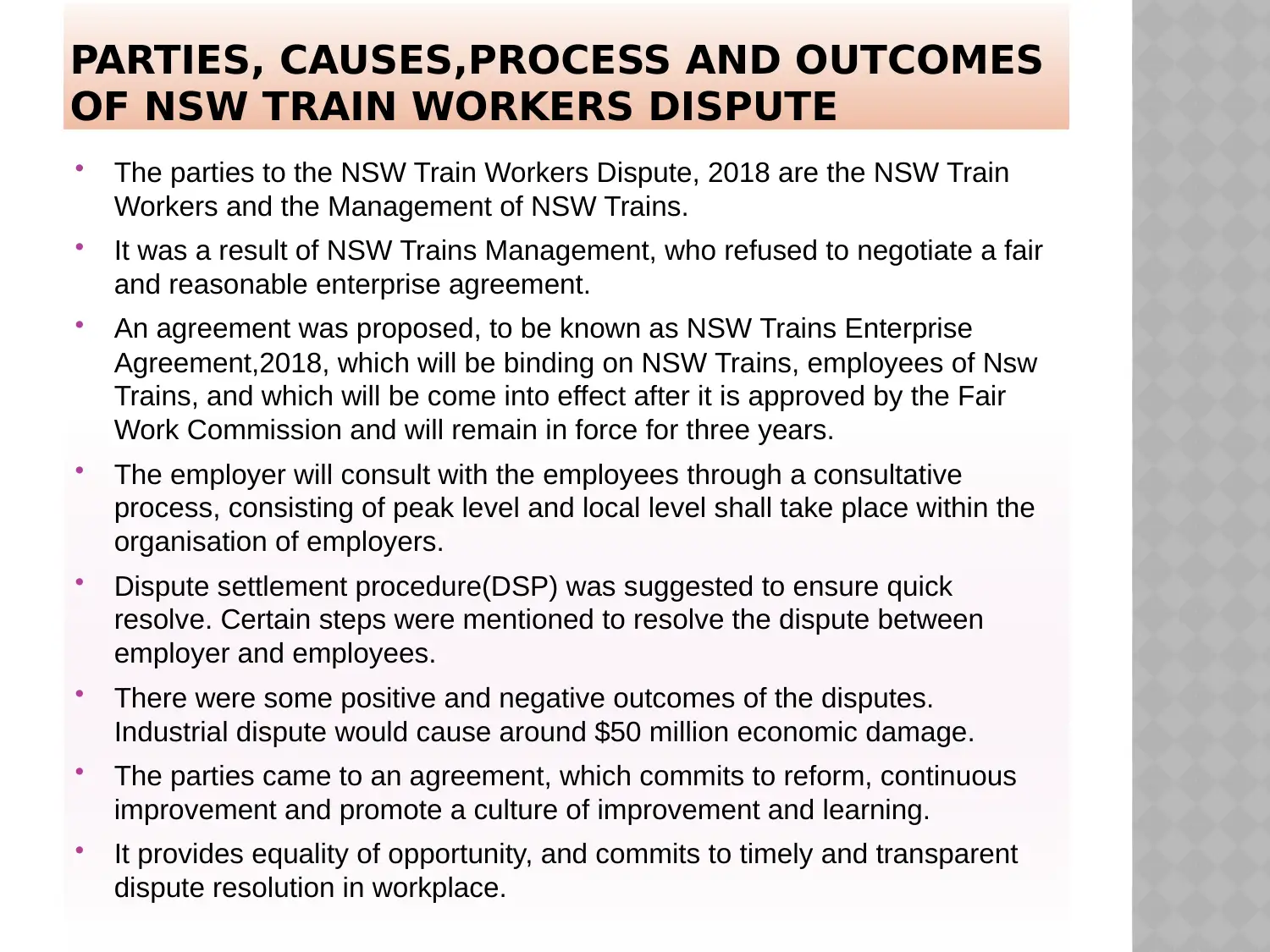
PARTIES, CAUSES,PROCESS AND OUTCOMES
OF NSW TRAIN WORKERS DISPUTE
The parties to the NSW Train Workers Dispute, 2018 are the NSW Train
Workers and the Management of NSW Trains.
It was a result of NSW Trains Management, who refused to negotiate a fair
and reasonable enterprise agreement.
An agreement was proposed, to be known as NSW Trains Enterprise
Agreement,2018, which will be binding on NSW Trains, employees of Nsw
Trains, and which will be come into effect after it is approved by the Fair
Work Commission and will remain in force for three years.
The employer will consult with the employees through a consultative
process, consisting of peak level and local level shall take place within the
organisation of employers.
Dispute settlement procedure(DSP) was suggested to ensure quick
resolve. Certain steps were mentioned to resolve the dispute between
employer and employees.
There were some positive and negative outcomes of the disputes.
Industrial dispute would cause around $50 million economic damage.
The parties came to an agreement, which commits to reform, continuous
improvement and promote a culture of improvement and learning.
It provides equality of opportunity, and commits to timely and transparent
dispute resolution in workplace.
OF NSW TRAIN WORKERS DISPUTE
The parties to the NSW Train Workers Dispute, 2018 are the NSW Train
Workers and the Management of NSW Trains.
It was a result of NSW Trains Management, who refused to negotiate a fair
and reasonable enterprise agreement.
An agreement was proposed, to be known as NSW Trains Enterprise
Agreement,2018, which will be binding on NSW Trains, employees of Nsw
Trains, and which will be come into effect after it is approved by the Fair
Work Commission and will remain in force for three years.
The employer will consult with the employees through a consultative
process, consisting of peak level and local level shall take place within the
organisation of employers.
Dispute settlement procedure(DSP) was suggested to ensure quick
resolve. Certain steps were mentioned to resolve the dispute between
employer and employees.
There were some positive and negative outcomes of the disputes.
Industrial dispute would cause around $50 million economic damage.
The parties came to an agreement, which commits to reform, continuous
improvement and promote a culture of improvement and learning.
It provides equality of opportunity, and commits to timely and transparent
dispute resolution in workplace.
Paraphrase This Document
Need a fresh take? Get an instant paraphrase of this document with our AI Paraphraser
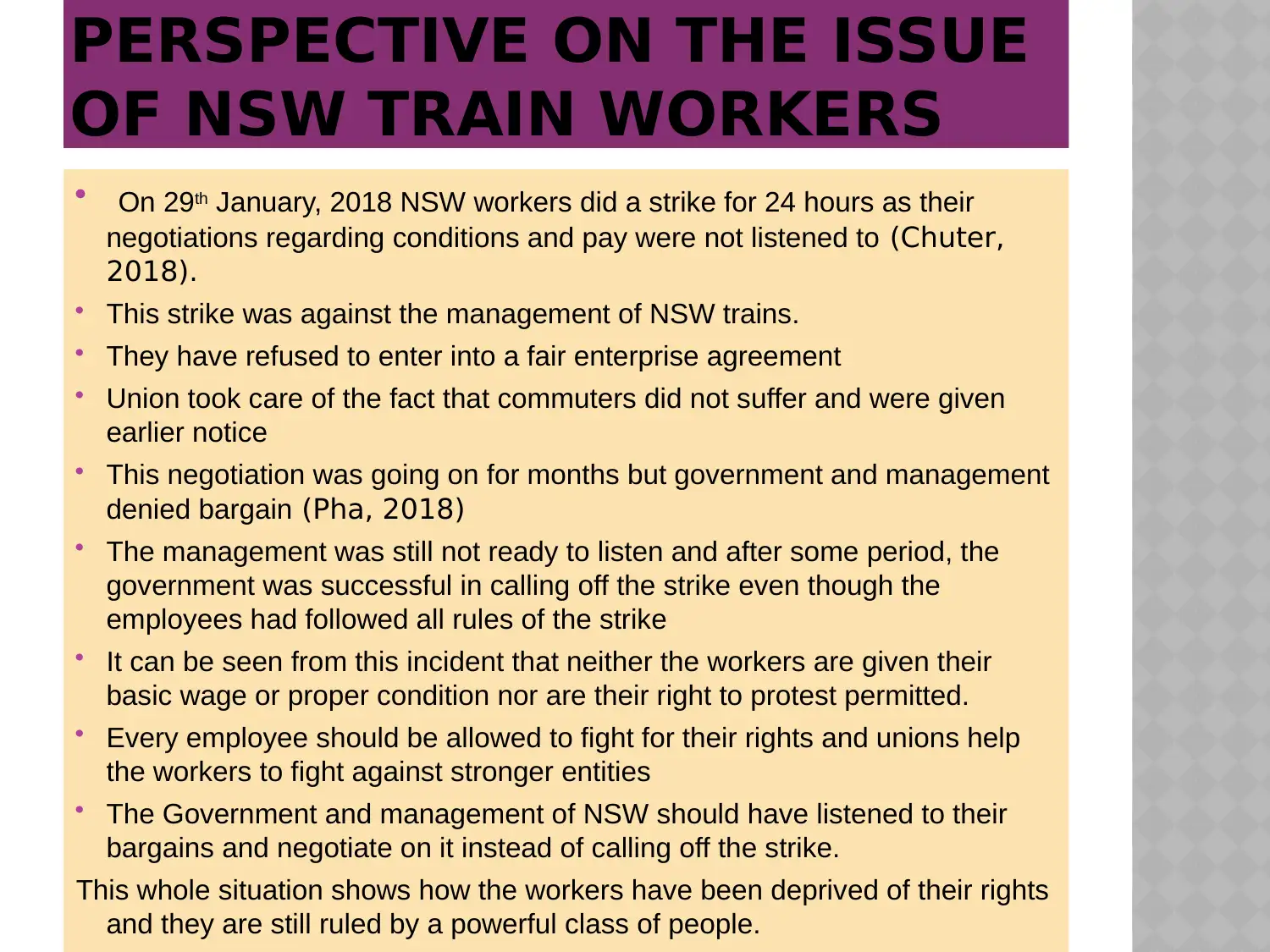
PERSPECTIVE ON THE ISSUE
OF NSW TRAIN WORKERS
On 29th January, 2018 NSW workers did a strike for 24 hours as their
negotiations regarding conditions and pay were not listened to (Chuter,
2018).
This strike was against the management of NSW trains.
They have refused to enter into a fair enterprise agreement
Union took care of the fact that commuters did not suffer and were given
earlier notice
This negotiation was going on for months but government and management
denied bargain (Pha, 2018)
The management was still not ready to listen and after some period, the
government was successful in calling off the strike even though the
employees had followed all rules of the strike
It can be seen from this incident that neither the workers are given their
basic wage or proper condition nor are their right to protest permitted.
Every employee should be allowed to fight for their rights and unions help
the workers to fight against stronger entities
The Government and management of NSW should have listened to their
bargains and negotiate on it instead of calling off the strike.
This whole situation shows how the workers have been deprived of their rights
and they are still ruled by a powerful class of people.
OF NSW TRAIN WORKERS
On 29th January, 2018 NSW workers did a strike for 24 hours as their
negotiations regarding conditions and pay were not listened to (Chuter,
2018).
This strike was against the management of NSW trains.
They have refused to enter into a fair enterprise agreement
Union took care of the fact that commuters did not suffer and were given
earlier notice
This negotiation was going on for months but government and management
denied bargain (Pha, 2018)
The management was still not ready to listen and after some period, the
government was successful in calling off the strike even though the
employees had followed all rules of the strike
It can be seen from this incident that neither the workers are given their
basic wage or proper condition nor are their right to protest permitted.
Every employee should be allowed to fight for their rights and unions help
the workers to fight against stronger entities
The Government and management of NSW should have listened to their
bargains and negotiate on it instead of calling off the strike.
This whole situation shows how the workers have been deprived of their rights
and they are still ruled by a powerful class of people.
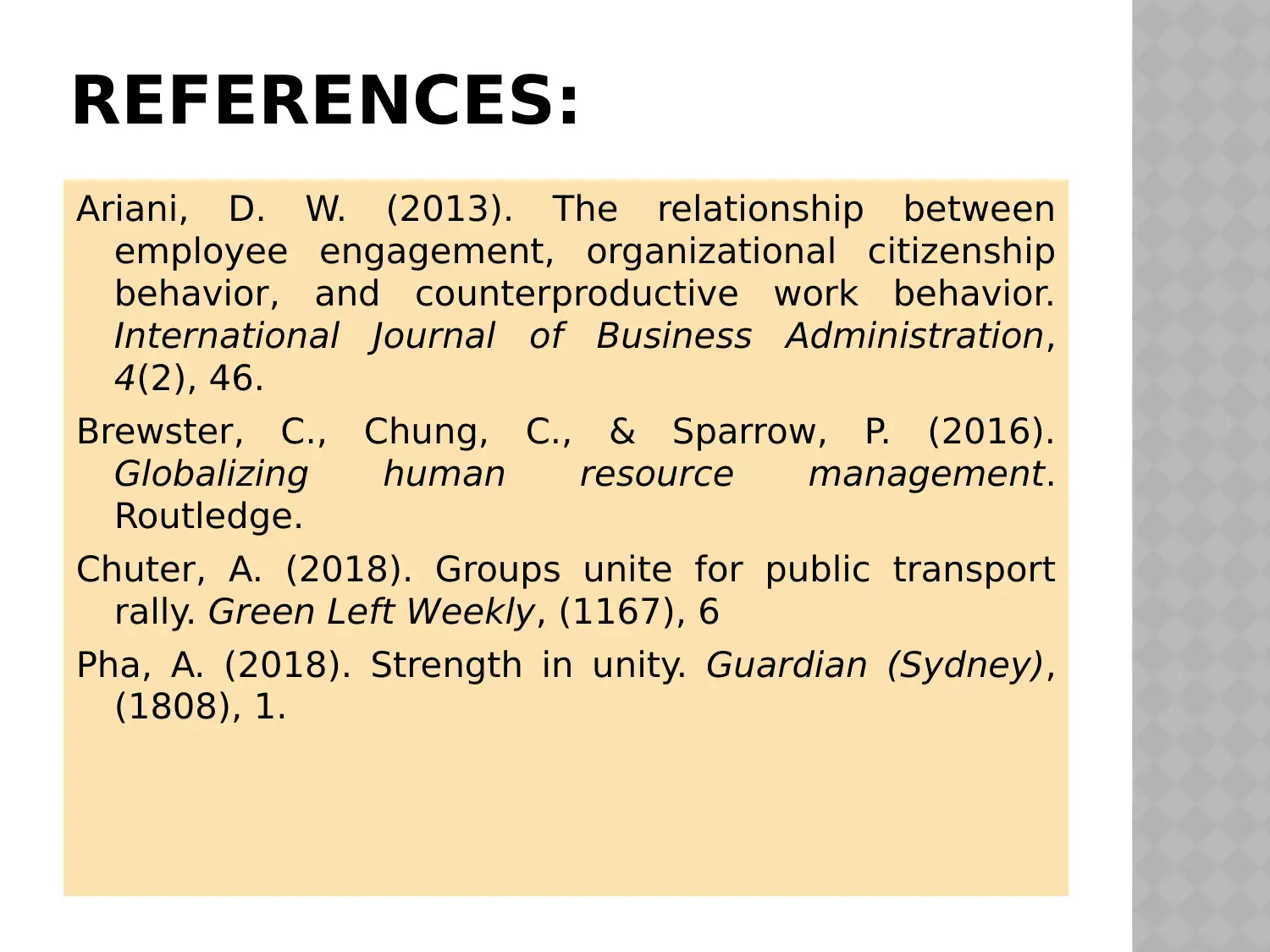
REFERENCES:
Ariani, D. W. (2013). The relationship between
employee engagement, organizational citizenship
behavior, and counterproductive work behavior.
International Journal of Business Administration,
4(2), 46.
Brewster, C., Chung, C., & Sparrow, P. (2016).
Globalizing human resource management.
Routledge.
Chuter, A. (2018). Groups unite for public transport
rally. Green Left Weekly, (1167), 6
Pha, A. (2018). Strength in unity. Guardian (Sydney),
(1808), 1.
Ariani, D. W. (2013). The relationship between
employee engagement, organizational citizenship
behavior, and counterproductive work behavior.
International Journal of Business Administration,
4(2), 46.
Brewster, C., Chung, C., & Sparrow, P. (2016).
Globalizing human resource management.
Routledge.
Chuter, A. (2018). Groups unite for public transport
rally. Green Left Weekly, (1167), 6
Pha, A. (2018). Strength in unity. Guardian (Sydney),
(1808), 1.
⊘ This is a preview!⊘
Do you want full access?
Subscribe today to unlock all pages.

Trusted by 1+ million students worldwide
1 out of 6
Related Documents
Your All-in-One AI-Powered Toolkit for Academic Success.
+13062052269
info@desklib.com
Available 24*7 on WhatsApp / Email
![[object Object]](/_next/static/media/star-bottom.7253800d.svg)
Unlock your academic potential
Copyright © 2020–2026 A2Z Services. All Rights Reserved. Developed and managed by ZUCOL.




